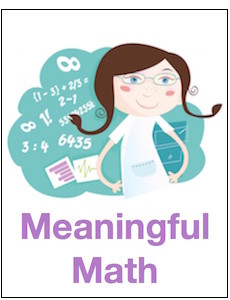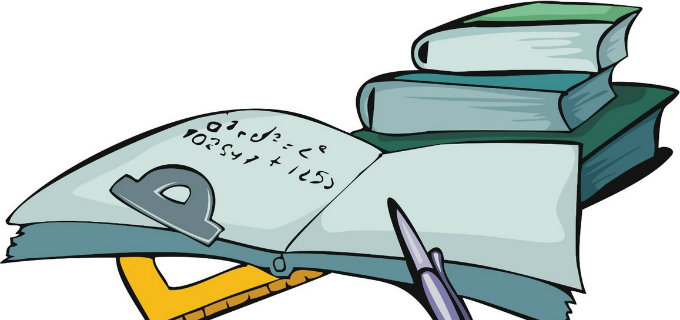Should We Do More Writing in Math Class?
A MiddleWeb Blog
 I’ve been thinking a lot about writing in math class lately.
I’ve been thinking a lot about writing in math class lately.
After seeing my students continue to struggle with word problems year after year, I decided that incorporating writing in the classroom might help my students master word problems.
I also considered the possibility that those students who sometimes disconnect in math class, but are great writers, might find a new way to become more engaged and be more successful.
In a 2015 Edutopia article, 4 Tips for Writing in the Math Classroom, Heather Wolpert-Gawron shared her belief that math, like other content areas, “has a story to tell.”
Keeping a math journal
So this year I decided to have my students keep a math journal in an effort to incorporate more writing.
The journal idea is to provide students more opportunities to work word problems and invite them to explain their thinking. By explaining their thinking and justifying their answers (using words of their own), my hope is that they’ll improve their understanding and comprehension.
While I like the idea of journaling, I know from experience that students can find it frustrating when they have to justify their answers. And this is expecially true for problems that are very straight-forward and actually require little explanation.
I would like to know how other math teachers feel about this. Is it important for students to write about their thinking?
Writing about mistakes on tests
Another time I have my students write is after a test. The students look at the problems they missed, make corrections, and explain why they think they missed the problem and what the correct answer is. In the past, I have always thought that this was a solid teaching practice.

I would love to know how other math teachers feel about this. Are test corrections and writing about misconceptions effective ways to improve student learning?
All of this was on my mind when I came across an article in The Atlantic, Explaining Your Math: Unnecessary at Best, Encumbering at Worst, which said that requiring a student to explain their thinking in math was not only unnecessary but could actually impede the student’s learning. This really prompted me to reconsider how I incorporate writing in my classroom.
Asking for students’ opinions
In keeping with my goal this year to more often ask students what they think, I decided to go to the consumers of this instruction. I had my students fill out a Google form (anonymously) which asked them if they thought writing in the math classroom was beneficial. I was pleased with the quality of their responses.
The vast majority of students felt that writing in math class was beneficial. One student specifically stated that it helped him with answering word problems. Another student said that she learned by writing, so it was beneficial for her. Other students said that it helped them retain information.
One student said it let them see whether they truly knew something. Many students felt that explaining the steps involved in a process was helpful.
The replies from other students who thought writing was not beneficial were very telling. One student said that seeing “a bunch of words” was confusing. Another student said that math was already hard and that writing about it was stressful. Some students felt that writing took away from learning about the material.
As I read all these responses, I could see the validity of what everyone had to say.

On the other hand, many students thought explaining their thinking would help them retain information. Another student simply said that it would help, “but it’s not fun.”
Tweaking the math journals
All in all, my students came up with some solid suggestions that I am excited to try. I still plan to have students complete a math journal, and I also plan to add some prompts that simply ask students to share where they are struggling or where they are having success. Hopefully students will be able to write about a “light bulb” moment they have had.
However, overall, I plan to reduce the quantity of journal prompts (based on student suggestions) and concentrate on providing quality prompts.

I also plan to add small writing assignments in class, such as a one- sentence summary. (See 4 Tips for Writing in the Math Classroom.)
I need to recognize that some students find writing difficult and that writing might not be the best way to help them progress, while other students need to verbalize their thinking to retain it and solidify their learning.
In other words, while writing helps some students, it’s important to recognize that it’s not one-size-fits-all.






































I think your analysis of the work you are doing with your students is excellent. I struggled with these ideas (writing and vocabulary in math) for years and finally tested my beliefs about the power of the “language” of mathematics at the middle school level, grades 7& 8, for three years in a school where I had administrative support. I copied and kept all student work to share with colleagues. I wrote about all this after the fact. You might find it interesting although it is old by today’s standards – but the book still sells. There must be many used copies around and in libraries. The title is: Teaching Mathematics Vocabulary in Context: Windows, Doors, and Secret Passageways, published by Heinemann, 2003. Good luck with your work! it was exciting to read about. Sincerely, Miki Murray, Retired teacher who still cares.
Thank you for your comment! I am so impressed! As a matter of fact, I ordered your book today! I love your idea of copying and keeping student work, the longer I teach the more I understand the importance of examining student work. Recently I have been using my IPAD to take pictures of student work so I can save and share with colleagues. Thanks so much for sharing your experience!
Writing in Math Class: I would like to use writing as an option for a second assessment (the first being a paper-pencil test). Other options could be organizational web, powerpoint, children’s book, etc. I did this a number of years ago and the students really enjoyed having some control about how they showed what their level of knowledge was. I had a general rubric and they would explain their plan to me first to make sure that it was doable.
Solving word problems: The best way is to read it out loud (softly); nine times out of ten this has worked for my students. It has something to do with everything becoming words instead of words and numerals. I have also had students draw pictures or actually act out the problem to understand it better. Another strategy is to have the students write their own word problems and exchange them with a neighbor. They then critique each other’s problem and try to solve it. I would then choose two of them and use them in the paper-pencil test. It really helps!
Barb Persoon, I’ve been teaching math for more than twenty years and it just keeps getting better
Thank you for your excellent suggestions! You know I really agree with your comment regarding having students read the problem out loud, for some reason that makes a big difference and I think what you said about it changing from numbers to words is probably the key. I also liked what you said about writing being used as a second assessment. I would love to know how your rubric was structured, I don’t feel very confident in my rubric making skills! Thanks again!
I believe writing in a math classroom fosters deeper understanding. I too had students “uncover” their mistakes from an exam through writing and found that it helped most students understand. In many other parts of the world, educators spend a great deal of time analyzing mistakes. Through careful and thoughtful consideration, students can grow, learn and understand.
Thank you for your comment! I agree with your comment about students “uncovering” their mistakes (I really like that description).
I believe writing in math is an excellent way to retain and reengage information in math. However I am a new first grade teacher who often finds that writing itself is a challenge in the first grade. We have started math journals but often students are copying what I have written. They are given additional problems to solve in their journals, but writing and sometimes reading itself is a challenge. How can I make the most of my math journals with students that struggle with recording information.